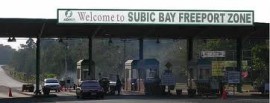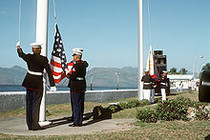Subic Bay Freeport Zone
Also below: Philippines World's Best Country in Business English
Subic Bay Freeport Zone is 110 kilometers north of Manila. With an area of the 262 square miles (670 square kilometer), SBFZ is a former US Naval facility that was transformed in 1992 into a tourism, industrial, commercial, financial, and investment hub in Southeast Asia , a tax- and duty-free zone similar to Hong Kong and Singapore.
Managed by the Subic Bay Metropolitan Authority, the freeport zone covers the fenced area of the former U.S. Naval Base Subic Bay located in the southwest of Luzon Island in the Philippines and surrounded by the municipalities of Subic and Olongapo City in the province Zambales, Hermosa and Morong in Bataan.
The mountain ranges around the Subic Bay area and the deep natural harbor provide excellent and protected anchorage. In addition, these features make SBFZ naturally sheltered from typhoons as well as from the effects of an eruption of nearby Mt. Pinatubo.
Southeast Asia's Investment Hub
Subic has since been transformed and became a model for bases conversion into commercial use after the Cold War with blue chip companies like Coastal Petroleum, and Fed Ex pumping in over $3 billion of investments.
Subic was host to the 4th APEC Leaders' Summit on November 24, 1996. FedEx's Asia-Pacific hub was also located in Subic Bay for almost ten years.
Subic Bay, the Philippines' first free port continues to be one of the country's major economic engines with more than 700 investment projects, including the 4th largest shipbuilding facility in the world, Hanjin Heavy Industries and Construction (HHIC)).
Currently upgrading its port facilities through the Subic Bay Port Development Project and forging ties with the Clark Special Economic Zone in Angeles City, Pampanga to form the Subic-Clark Corridor via the 45-kilometer Subic-Clark-Tarlac Expressway, these once bastions of western military might are now being positioned to become the most competitive international service and logistics center in Southeast Asia.
LATEST ECONOMIC NEWS - NEW YORK TIMES 8/27/2012
> A Youthful Populace Helps Make the Philippines an Economic Bright Spot in Asia
Subic Bay and the Southeast Asian Map
WORLD'S BEST COUNTRY IN BUSINESS ENGLISH
By Shielo Mendoza | Yahoo! Southeast Asia Newsroom – Wed, Apr 25, 2012
The Philippines was named the world’s best country in business English proficiency, even beating the United States, according to a recent study by GlobalEnglish Corporation.
GlobalEnglish has released early this month the results of its annual Business English Index (BEI), the only index that measures business English proficiency in the workplace.
For 2012, results showed that from 76 represented countries worldwide, only the Philippines attained a score above 7.0, "a BEI level within range of a high proficiency that indicates an ability to take an active role in business discussions and perform relatively complex tasks."
“This is particularly interesting because the Philippines, a country with one-tenth of the population of India, recently overtook India as a hub for call centers. Over 400,000 Filipinos are now employed in call centers, roughly 50,000 more than in India,” the study said.
The Philippines, which scored 7.11 and the lone country in the intermediate level, were joined by Norway (6.54), Estonia (6.45), Serbia (6.38) and Slovenia (6.19) in the top five.
GlobalEnglish noted that a country’s business English capability is an indicator of its economic growth and business success.
“It is not surprising that both the Philippines and Norway—the only two countries in the top five in both 2011 and 2012—are improving their economies, based on the latest GDP data from the World Bank,” it added.
Meanwhile, struggling economic powers (Japan, Italy and Mexico) and fast-growth emerging markets (Brazil, Columbia and Chile) scored below a 4.0 in business English proficiency, placing them at a disadvantage when competing in a global marketplace, the study said.
It also pointed out that shifts in global talent have put even English-speaking countries at risk.
“Surprisingly the BEI score for global workers in the U.S. declined from 6.9 to 5.09 since the original 2011 BEI benchmark, which is attributed to a majority of test takers being foreign-born engineers and scientists,” the report said.
Rest of the world ranked beginner and basic level
Based on a scale of 1-10, the average 2012 BEI score across 108,000 test takers around the world is 4.15 which is lower than last year’s 4.46.
Nearly four out of 10 (38.2 percent) global workers from 76 countries were ranked as business English beginners, meaning that, on average, they can’t understand or communicate basic information during virtual or in-person meetings, read or write professional emails in English or deal with complexity and rapid change in a global business environment, the study said.
Meanwhile, the majority of global workers (60.5 percent) from the represented countries scored between a 4.0 and 7.0, below an intermediate level, indicating an inability to take an active role in business discussions or perform relatively complex tasks such as presentation development and customer or partner negotiations, it added.
GlobalEnglish stressed that the 2012 BEI which showed a lack of business English proficiency is threatening the productivity of companies, industries and country-specific economies this year.
“Poor Business English skills are bad for global businesses and this year’s Business English Index suggests that many companies will be hard-pressed to achieve their desired performance goals during 2012,” said Tom Kahl, GlobalEnglish President.
“Addressing English skills gaps and ensuring that employees can immediately perform at the necessary proficiency level should be viewed as a strategic imperative for multinational businesses, as Enterprise Fluency, the ability to seamlessly communicate and collaborate within global organizations, can deliver significant financial upside,” Kahl added.
Headquartered in Brisbane, California, GlobalEnglish works with multinational companies – including Cisco, Procter and Gamble, HSBC, Phzer – to support performance in business English across the workforce around the world.
Here's the list of the 10 best and worst countries in the world for business English proficiency based on GlobalEnglish's 2012 BEI:
10 Best Countries:
Philippines
Norway
Serbia
Slovenia
Australia
Malaysia
India
Lithuania
Singapore
Canada
10 Worst Countries:
Armenia
Cote d'Ivoire
Taiwan
Honduras
Columbia
Chile
El Salvador






























